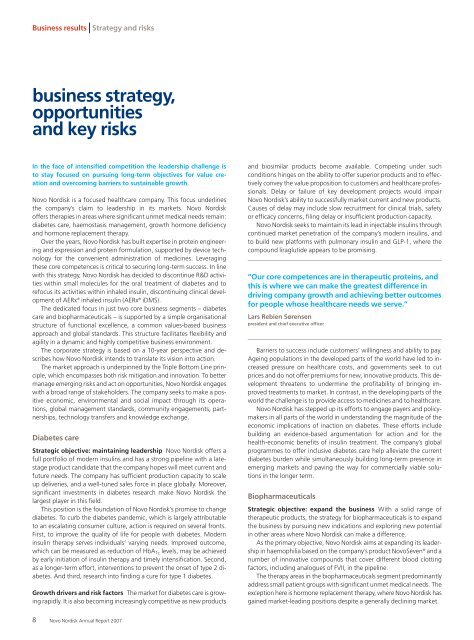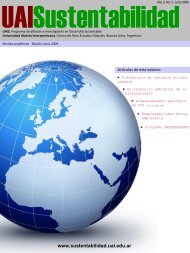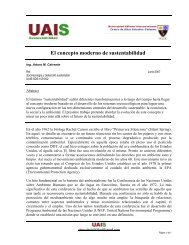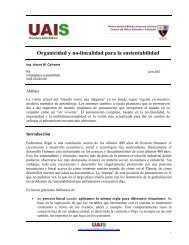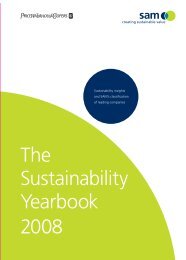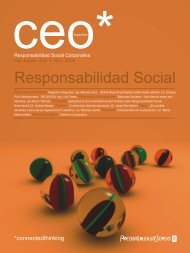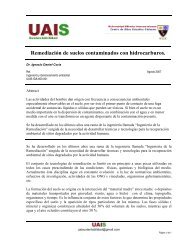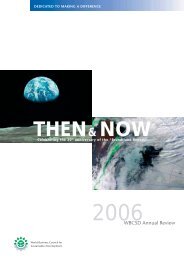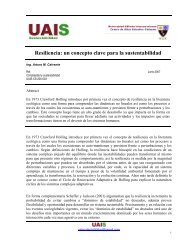You also want an ePaper? Increase the reach of your titles
YUMPU automatically turns print PDFs into web optimized ePapers that Google loves.
Business results Strategy and risks<br />
business strategy,<br />
opportunities<br />
and key risks<br />
In the face of intensified competition the leadership challenge is<br />
to stay focused on pursuing long-term objectives for value creation<br />
and overcoming barriers to sustainable growth.<br />
<strong>Novo</strong> <strong>Nordisk</strong> is a focused healthcare company. This focus underlines<br />
the company’s claim to leadership in its markets. <strong>Novo</strong> <strong>Nordisk</strong><br />
offers therapies in areas where significant unmet medical needs remain:<br />
diabetes care, haemostasis management, growth hormone deficiency<br />
and hormone replacement therapy.<br />
Over the years, <strong>Novo</strong> <strong>Nordisk</strong> has built expertise in protein engineering<br />
and expression and protein formulation, supported by device technology<br />
for the convenient administration of medicines. Leveraging<br />
these core competences is critical to securing long-term success. In line<br />
with this strategy, <strong>Novo</strong> <strong>Nordisk</strong> has decided to discontinue R&D activities<br />
within small molecules for the oral treatment of diabetes and to<br />
refocus its activities within inhaled insulin, discontinuing clinical development<br />
of AERx ® inhaled insulin (AERx ® iDMS).<br />
The dedicated focus in just two core business segments – diabetes<br />
care and biopharmaceuticals – is supported by a simple organisational<br />
structure of functional excellence, a common values-based business<br />
approach and global standards. This structure facilitates flexibility and<br />
agility in a dynamic and highly competitive business environment.<br />
The corporate strategy is based on a 10-year perspective and describes<br />
how <strong>Novo</strong> <strong>Nordisk</strong> intends to translate its vision into action.<br />
The market approach is underpinned by the Triple Bottom Line principle,<br />
which encompasses both risk mitigation and innovation. To better<br />
manage emerging risks and act on opportunities, <strong>Novo</strong> <strong>Nordisk</strong> engages<br />
with a broad range of stakeholders. The company seeks to make a positive<br />
economic, environmental and social impact through its operations,<br />
global management standards, community engagements, partnerships,<br />
technology transfers and knowledge exchange.<br />
Diabetes care<br />
Strategic objective: maintaining leadership <strong>Novo</strong> <strong>Nordisk</strong> offers a<br />
full portfolio of modern insulins and has a strong pipeline with a latestage<br />
product candidate that the company hopes will meet current and<br />
future needs. The company has sufficient production capacity to scale<br />
up deliveries, and a well-tuned sales force in place globally. Moreover,<br />
significant investments in diabetes research make <strong>Novo</strong> <strong>Nordisk</strong> the<br />
largest player in this field.<br />
This position is the foundation of <strong>Novo</strong> <strong>Nordisk</strong>’s promise to change<br />
diabetes. To curb the diabetes pandemic, which is largely attributable<br />
to an escalating consumer culture, action is required on several fronts.<br />
First, to improve the quality of life for people with diabetes. Modern<br />
insulin therapy serves individuals’ varying needs. Improved outcome,<br />
which can be measured as reduction of HbA 1c levels, may be achieved<br />
by early initiation of insulin therapy and timely intensification. Second,<br />
as a longer-term effort, interventions to prevent the onset of type 2 diabetes.<br />
And third, research into finding a cure for type 1 diabetes.<br />
Growth drivers and risk factors The market for diabetes care is growing<br />
rapidly. It is also becoming increasingly competitive as new products<br />
and biosimilar products become available. Competing under such<br />
conditions hinges on the ability to offer superior products and to effectively<br />
convey the value proposition to customers and healthcare professionals.<br />
Delay or failure of key development projects would impair<br />
<strong>Novo</strong> <strong>Nordisk</strong>’s ability to successfully market current and new products.<br />
Causes of delay may include slow recruitment for clinical trials, safety<br />
or efficacy concerns, filing delay or insufficient production capacity.<br />
<strong>Novo</strong> <strong>Nordisk</strong> seeks to maintain its lead in injectable insulins through<br />
continued market penetration of the company’s modern insulins, and<br />
to build new platforms with pulmonary insulin and GLP-1, where the<br />
compound liraglutide appears to be promising.<br />
“Our core competences are in therapeutic proteins, and<br />
this is where we can make the greatest difference in<br />
driving company growth and achieving better outcomes<br />
for people whose healthcare needs we serve.”<br />
Lars Rebien Sørensen<br />
president and chief executive officer<br />
Barriers to success include customers’ willingness and ability to pay.<br />
Ageing populations in the developed parts of the world have led to increased<br />
pressure on healthcare costs, and governments seek to cut<br />
prices and do not offer premiums for new, innovative products. This development<br />
threatens to undermine the profitability of bringing improved<br />
treatments to market. In contrast, in the developing parts of the<br />
world the challenge is to provide access to medicines and to healthcare.<br />
<strong>Novo</strong> <strong>Nordisk</strong> has stepped up its efforts to engage payers and policymakers<br />
in all parts of the world in understanding the magnitude of the<br />
economic implications of inaction on diabetes. These efforts include<br />
building an evidence-based argumentation for action and for the<br />
health-economic benefits of insulin treatment. The company’s global<br />
programmes to offer inclusive diabetes care help alleviate the current<br />
diabetes burden while simultaneously building long-term presence in<br />
emerging markets and paving the way for commercially viable solutions<br />
in the longer term.<br />
Biopharmaceuticals<br />
Strategic objective: expand the business With a solid range of<br />
therapeutic products, the strategy for biopharmaceuticals is to expand<br />
the business by pursuing new indications and exploring new potential<br />
in other areas where <strong>Novo</strong> <strong>Nordisk</strong> can make a difference.<br />
As the primary objective, <strong>Novo</strong> <strong>Nordisk</strong> aims at expanding its leadership<br />
in haemophilia based on the company’s product <strong>Novo</strong>Seven ® and a<br />
number of innovative compounds that cover different blood clotting<br />
factors, including analogues of FVII, in the pipeline.<br />
The therapy areas in the biopharmaceuticals segment predominantly<br />
address small patient groups with significant unmet medical needs. The<br />
exception here is hormone replacement therapy, where <strong>Novo</strong> <strong>Nordisk</strong> has<br />
gained market-leading positions despite a generally declining market.<br />
8 <strong>Novo</strong> <strong>Nordisk</strong> <strong>Annual</strong> <strong>Report</strong> <strong>2007</strong>


